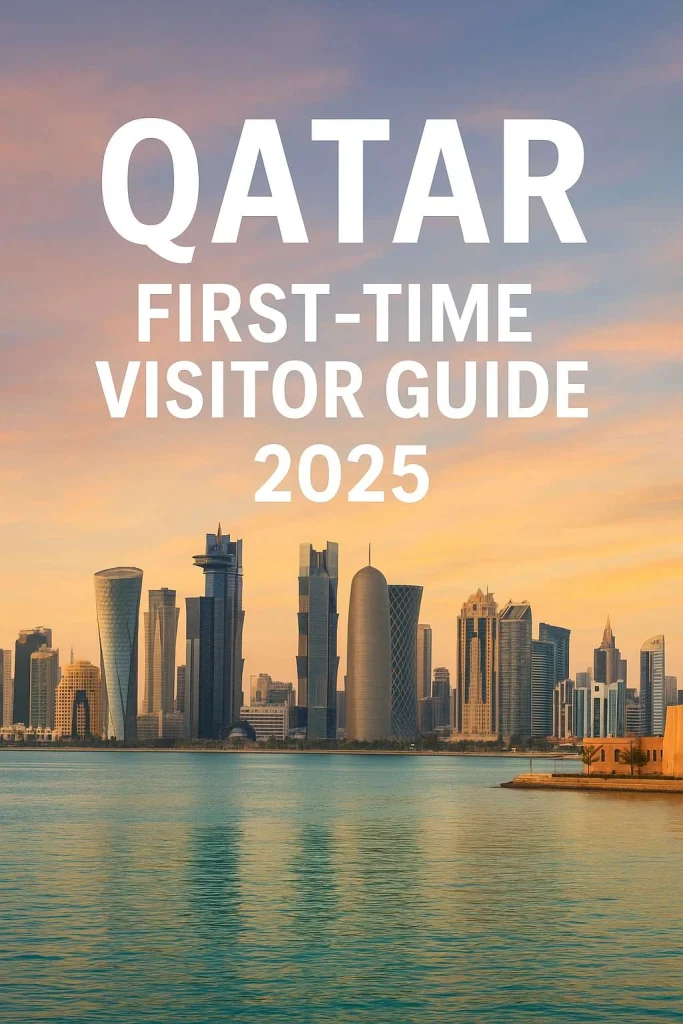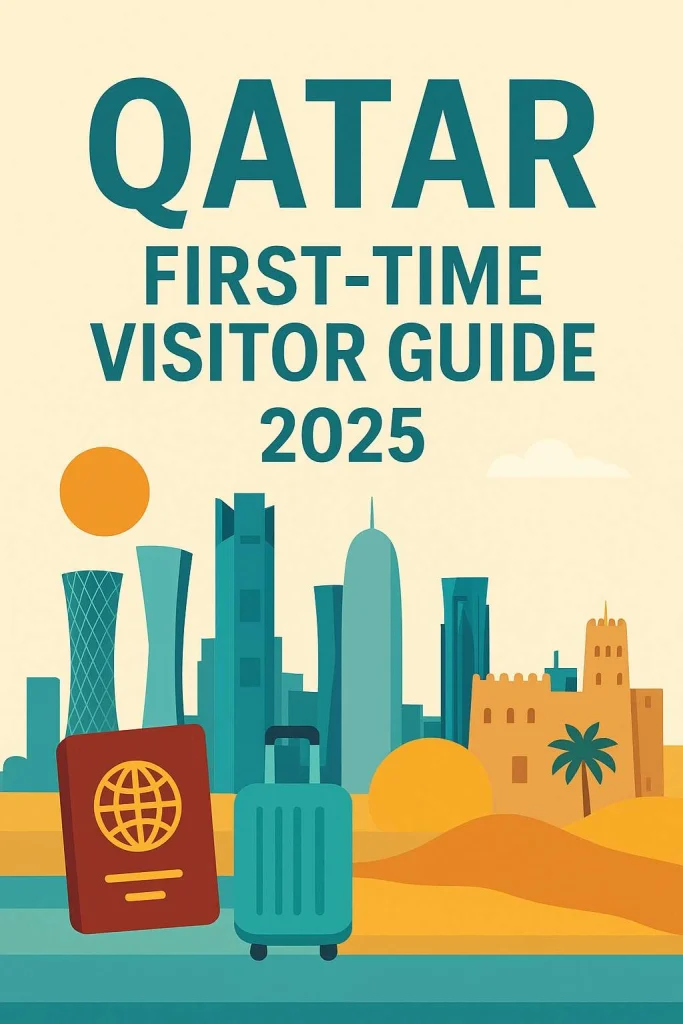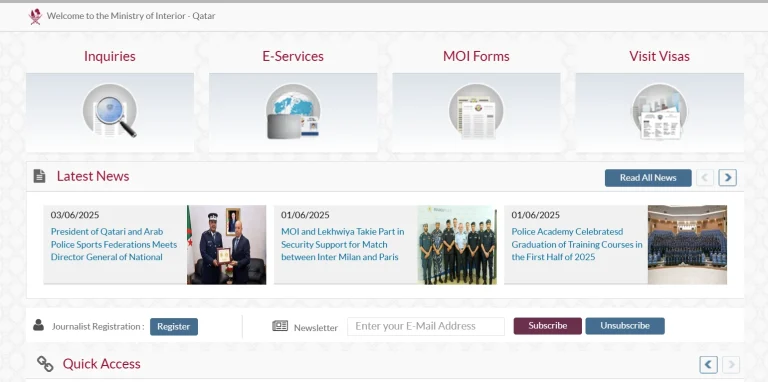Planning your next adventure? Our Qatar First-Time Visitors Guide helps you explore Doha and beyond with ease. From Hamad International Airport’s world-class facilities to desert safaris, beaches, and cultural attractions, Qatar offers luxury, safety, and unforgettable experiences for first-time travelers to the Middle East.
What Makes Qatar a Unique Destination for First-Time Travelers
Qatar’s charm lies in its perfect mix of authentic Arabian culture and futuristic development. Travelers can explore traditional markets like Souq Waqif, admire architectural marvels such as the National Museum of Qatar, and relax at The Pearl or Lusail Marina — all within a short drive. The country’s compact size, efficient transport system, and genuine hospitality make it easy and comfortable for newcomers. Whether you’re seeking cultural experiences, outdoor adventures, or luxury travel, Qatar delivers it all with signature Qatari warmth.You can visit official Visit Qatar tourism website here.
Is it safe to travel to qatar right now
Yes, Qatar is generally considered safe for travelers. The country has a very low crime rate, excellent healthcare, and well-maintained public spaces. However, as with any international travel, it’s important to stay informed about regional developments and follow standard safety precautions.

Planning Your Trip to Qatar
Visa Requirements and Entry Process
Before you fly, check if you need a visa. Many travelers can enter Qatar visa-free or get one on arrival. Make sure your passport is valid for six months and keep a return ticket ready—it’s often asked at immigration.
Health, Vaccination, and Travel Insurance
No special vaccines are required, but it’s wise to be up to date on routine shots. Travel insurance is a must, as medical care is excellent but can be expensive without coverage.
Best Time to Visit Qatar
The best time to explore is from November to March when the weather is cooler. You can enjoy outdoor events, desert tours, and festivals without the summer heat.
Also read this: Qatar family visit visa
Packing Tips for the Desert Climate
Pack light, breathable clothes and sun protection. Modest dress is appreciated in public places. In winter, a light jacket comes in handy for cooler evenings.
Understanding Qatari Culture and Lifestyle
Friday Vibes – Weekend Culture in Qatar
- The weekend in Qatar is on Friday and Saturday.
- Friday is a sacred day for prayer and rest — most businesses open after Friday prayers (Jumu’ah).
- Locals often spend evenings at parks, beaches, or souqs with family.
- It’s the perfect day to explore Souq Waqif or enjoy traditional Qatari food at local restaurants.
Islamic Holidays – Join the Festivities
- Major Islamic celebrations include:
- Eid al-Fitr – Marks the end of Ramadan with feasts and family gatherings.
- Eid al-Adha – Celebrated with prayers and sharing food with the needy.
- Eid al-Fitr – Marks the end of Ramadan with feasts and family gatherings.
- Visitors can join community events, enjoy cultural performances, and experience Qatar’s hospitality.
Also read this about qatar public holidays
Ramadan – Show Respect and Join the Spirit

- Ramadan is a month of fasting and reflection for Muslims.
- Visitors should:
- Avoid eating, drinking, or smoking in public during daylight hours.
- Dress modestly and act respectfully in public spaces.
- Try iftar buffets at hotels or Ramadan tents — a great way to taste Qatari cuisine.
- Avoid eating, drinking, or smoking in public during daylight hours.
Dress Code and Public Etiquette
- Qatar values modesty and respect in attire and behavior.
- For women: Avoid sleeveless tops and short skirts in public.
- For men: Avoid wearing tank tops or shorts in public places.
- Public displays of affection and loud arguments should be avoided.
- Always greet locals with a polite “As-salamu alaykum” (peace be upon you) — it’s appreciated.
Alcohol Regulations and Cultural Expectations
- Alcohol is restricted but available in licensed venues only, such as:
- International hotels
- Certain clubs and airport lounges
- International hotels
- Illegal actions include:
- Drinking in public
- Being intoxicated outside licensed premises
- Drinking in public
- Qatar promotes a family-oriented environment, so always consume responsibly.
What is the Legal Drinking Age in Qatar?
If you’re wondering “what is the drinking age in Qatar”, the legal age is 21 years old. Alcohol is permitted only in licensed hotels, bars, and private clubs.
Banned Practices and Laws You Should Know
- Avoid photographing:
- Government buildings
- Military sites
- Local women without permission
- Government buildings
- Illegal activities:
- Using offensive or vulgar language
- Public indecency
- Importing alcohol, pork products, or drugs
- Using offensive or vulgar language
- Always carry a copy of your passport and residence permit if staying long-term.
Money, Tipping, and Currency Regulations
Qatari Riyal (QAR) – Understanding the Currency
- The official currency is the Qatari Riyal (QAR).
- It’s pegged to the US Dollar at a fixed rate of 1 USD = 3.64 QAR.
- Banknotes come in 1, 5, 10, 50, 100, 200, and 500 Riyal denominations.
- Coins (dirhams) are rarely used — most transactions are done with notes or digital payments.
Money Exchange, ATMs, and Card Payments
- Currency can be exchanged easily at:
- Hamad International Airport
- Shopping malls
- Banks and exchange houses such as Al Zaman or Gulf Exchange
- Hamad International Airport
- ATMs are widely available and support international cards (Visa, MasterCard).
- Credit and debit cards are accepted almost everywhere — even in taxis and cafés.
- For small purchases in souqs or local markets, it’s better to carry cash.
Currency Import and Customs Rules
- Visitors may bring up to QAR 50,000 (or equivalent in foreign currency) without declaration.
- Larger amounts must be declared at customs upon arrival.
- Carrying or transferring money linked to unverified sources can lead to fines or confiscation.
- Always keep exchange receipts if you plan to re-convert money before leaving.
Tipping Culture in Hotels, Taxis, and Restaurants
- Tipping isn’t mandatory in Qatar but is appreciated for good service.
- Restaurants: 10–15% of the bill (check if service charge is included).
- Hotels: QAR 5–10 for porters and housekeeping staff.
- Taxis: Round up the fare to the nearest QAR 5–10.
- Restaurants: 10–15% of the bill (check if service charge is included).
- For delivery drivers or valet attendants, a small tip shows gratitude and respect.
Safety, Security, and Accessibility
General Safety Tips for Travelers
- Qatar is ranked among the world’s safest destinations, with extremely low crime rates and strong law enforcement.
- Solo travelers, families, and women can feel secure exploring even at night, as streets and public spaces are well-lit and monitored.
- However, a few precautions help ensure a trouble-free stay:
- Keep important documents (passport, ID, insurance card) in a secure bag or hotel safe.
- Avoid public arguments or photographing locals without permission.
- Follow traffic rules carefully — fines for violations can be steep.
- Respect religious and cultural boundaries, especially during Ramadan or at mosques.
- Keep important documents (passport, ID, insurance card) in a secure bag or hotel safe.
- Qatar’s police and emergency teams are highly responsive, and there’s a visible security presence in major tourist areas, ensuring visitors’ peace of mind.
Emergency Numbers – Save These Now
In case of emergencies, Qatar’s response services are fast and multilingual. Keep these numbers handy:
- Police / Ambulance / Fire: 999
- Traffic accidents (non-emergency): 992
- Coastal or marine emergencies: 995
- Tourist helpline: 106 – available 24/7 in English, Arabic, Hindi, and Filipino.
- You can also approach any police patrol or security guard in shopping malls and metro stations — they’re trained to assist tourists quickly.
Accessibility – Everyone’s Welcome Here
- Qatar takes pride in being an inclusive travel destination, with major efforts to make public spaces accessible for everyone.
- Most modern areas like Doha Metro stations, Hamad International Airport, Katara Cultural Village, and The Pearl feature:
- Wheelchair ramps
- Accessible restrooms
- Braille signage
- Reserved parking and seating areas
- Wheelchair ramps
- The government continues to improve urban accessibility to ensure visitors with mobility challenges can enjoy a comfortable and independent experience.
Travelling with Special Accessibility Needs – The Accessible Qatar App
- The Accessible Qatar mobile app is an excellent resource for travelers with special needs.
- It provides detailed information about wheelchair-friendly hotels, restaurants, malls, museums, and public transport.
- Each location is rated by real users, helping travelers plan confidently and avoid accessibility issues.
- Whether you’re visiting for business or leisure, the app makes it easier to explore Qatar independently and comfortably.
Check qatar Airways travel guidelines here.
Emergency Assistance for Hearing-Impaired Visitors
For visitors who are deaf or hard of hearing, Qatar offers inclusive emergency communication options:
- 3G video call: 992 – for visual communication with operators.
- SMS to: 992 – include your full name, location, and type of help needed.
- Email: [email protected] – use this if you’re in a non-urgent situation (response times may vary).
- These services are handled by trained responders who can coordinate with local authorities quickly, ensuring everyone’s safety regardless of ability.
Health and Utilities
Hospitals and Emergency Healthcare
Qatar provides world-class healthcare services through both public and private hospitals.
Top facilities like Hamad General Hospital, Sidra Medicine, and Al Ahli Hospital offer 24/7 emergency care with multilingual staff.
Pharmacies are widely available across the country, especially in Doha, and most remain open late.
Travelers should:
Carry travel or health insurance, as treatment costs can be high without coverage.
Keep a list of emergency contacts and your hotel address.
Visit Primary Health Care Corporation (PHCC) centers for minor issues or checkups.
In case of emergencies, call 999 for an ambulance — response times are usually fast and efficient.
Drinking Water and General Hygiene:
Tap water in Qatar is treated and safe, but most residents prefer bottled or filtered water due to its taste.
Bottled water is affordable and easily available in supermarkets, cafes, and hotels.
Public hygiene standards are excellent, and most restaurants maintain strict cleanliness and food safety.
Always keep hand sanitizer and sunscreen with you — essential items in Qatar’s hot, outdoor climate.
During summer months, stay hydrated and avoid direct sun exposure for long periods.
Electricity – Plug in Without Worries:
Qatar uses 240 volts and 50 Hz frequency, with UK-style Type G plugs.
Travelers from countries like the United States, Canada, Japan, or parts of South America (which use 100–127 volts) should bring:
A universal plug adapter
A voltage converter for sensitive devices
Most hotels and malls sell adapters, but carrying your own ensures convenience.
For laptops, smartphones, and cameras, most modern chargers automatically support dual voltage, making them safe to plug in directly.
Connectivity and Communication
Local SIM Cards & Connectivity Options
- Staying connected in Qatar is easy and affordable, with excellent 5G coverage across the country.
- The two main mobile providers are Ooredoo and Vodafone, both offering tourist SIM cards with flexible data and call bundles.
- You can purchase SIMs at:
- Hamad International Airport (arrival area)
- Official retail outlets in malls
- Convenience kiosks across Doha
- Hamad International Airport (arrival area)
- A passport is required for SIM registration at the time of purchase.
Popular SIM Options:
- Ooredoo Visitor SIM:
- Starts from QAR 35 (≈ USD 9.5) for 2 GB data and local minutes, valid for 7 days.
- Premium plans go up to QAR 100 (≈ USD 27) for 20 GB data and international calls.
- Starts from QAR 35 (≈ USD 9.5) for 2 GB data and local minutes, valid for 7 days.
- Vodafone Tourist SIM:
- Basic plan from QAR 35 with 2 GB data and 25 international minutes.
- Larger bundles available for QAR 100–150, including 5G data and longer validity.
- Basic plan from QAR 35 with 2 GB data and 25 international minutes.
Card Fare Types:
- Standard Card Fares:
- Cost between QAR 35–75 depending on data and call duration.
- Ideal for short visits and basic usage (navigation, messages, calls).
- Cost between QAR 35–75 depending on data and call duration.
- Gold Club Card Fares:
- Range from QAR 100–200, offering higher data limits, faster 5G speeds, and discounts on international calls.
- Perfect for longer stays or business travelers who need high connectivity.
- Range from QAR 100–200, offering higher data limits, faster 5G speeds, and discounts on international calls.
Internet and Wi-Fi Access Across Qatar
- Qatar enjoys excellent 4G and 5G coverage, ensuring uninterrupted internet even in remote areas.
- Free public Wi-Fi is available at:
- Hamad International Airport
- Doha Metro stations
- Public libraries
- Major malls and hotels
- Hamad International Airport
- Average speeds exceed 100 Mbps, making it easy to stream, video call, or work online.
Connectivity and Language – How Easy It Is to Communicate
- English is widely spoken, making communication smooth for most visitors.
- Arabic remains the official language, but signs, menus, and apps are bilingual (Arabic & English).
- Learning a few simple Arabic words such as:
- “Shukran” (Thank you)
- “Min fadlak” (Please)
- “Marhaban” (Hello)
adds a friendly touch to interactions.
- “Shukran” (Thank you)
Useful Mobile Apps for Navigation, Taxis, and Translation
Download these essential apps to stay connected and move around easily:
- Karwa Taxi – Official government taxi app with transparent fares.
- Google Maps – Real-time routes and public transport directions.
- Qatar Rail App – Metro maps, timings, and fare details.
- Visit Qatar App – Lists top attractions, events, and travel tips.
Getting Around Qatar

Hamad International Airport Guide
- Hamad International Airport (HIA) in Doha is one of the world’s top-rated airports, known for its modern design, art displays, and smooth traveler experience.
- Located just 15 minutes from central Doha, it’s the main gateway to Qatar.
Facilities include:- 24-hour currency exchange counters, SIM card shops, and car rental desks.
- Free Wi-Fi, prayer rooms, luxury lounges, and sleeping pods.
- Public transport connections — taxis, metro, and buses right outside Arrivals.
- 24-hour currency exchange counters, SIM card shops, and car rental desks.
- The airport also features Orchard Garden, a tropical-style indoor area, perfect for relaxation between flights.
Public Transport – Doha Metro, Buses, and Karwa Taxis
- Doha Metro is the backbone of Qatar’s public transport — clean, affordable, and fully air-conditioned.
- Operates on three main lines (Red, Green, Gold) covering major areas like the airport, Souq Waqif, Katara, and Lusail.
- A standard ticket costs QAR 2–6, or buy a travel card for multiple trips.
- Operates on three main lines (Red, Green, Gold) covering major areas like the airport, Souq Waqif, Katara, and Lusail.
- Mowasalat (Karwa) runs the national bus and taxi network, offering reliable and budget-friendly rides.
- Buses connect the airport, city center, and key landmarks.
- Use a Karwa Smart Card to pay bus fares (available at airport and metro stations).
- Buses connect the airport, city center, and key landmarks.
- Karwa taxis are turquoise-colored, metered, and available at all major spots — fares start around QAR 10 for short trips.
Car Rentals, Driving Laws, and Parking Tips
- Renting a car gives you the freedom to explore beyond Doha — places like Zekreet, Al Khor, or the Inland Sea are best reached by car.
- Major agencies such as Hertz, Europcar, and Al Muftah have offices at the airport and across the city.
- To rent, you’ll need:
- A valid international driving permit (IDP) or a Qatar driving license.
- A credit card for security deposit.
- A valid international driving permit (IDP) or a Qatar driving license.
- Driving Tips:
- Drive on the right-hand side.
- Always wear seatbelts and follow speed limits — fines for violations are high.
- Parking is usually free in public areas but may require payment via ParkNow or metro apps in commercial zones.
- Drive on the right-hand side.
- Roads are well-marked, but using Google Maps or Waze helps avoid traffic during peak hours.
Ride-Hailing Apps (Uber, Careem, Karwa)
- Qatar’s main ride-hailing apps are:
- Uber – Best for quick and reliable city rides.
- Careem – Offers both car and bike delivery options.
- Karwa Taxi App – The official government taxi service with transparent fares and fixed rates.
- Average fares within Doha range from QAR 15–40, depending on distance and time.
- You can pay through cash, card, or in-app wallet.
- Ride-hailing is ideal for travelers who want comfort, air-conditioning, and door-to-door convenience.
Where to Stay in Qatar
Best Neighborhoods for Tourists (Doha Corniche, West Bay, The Pearl, Lusail)
Qatar offers a variety of neighborhoods that suit every type of traveler — from luxury seekers to cultural explorers.
Here are some of the most popular areas to stay:
- Doha Corniche – Perfect for first-time visitors who want scenic views of the Arabian Gulf. The area is close to Souq Waqif, Museum of Islamic Art, and Doha Port, making it ideal for sightseeing and evening walks along the waterfront.
- West Bay – Known as Doha’s modern business and hotel district, filled with five-star hotels, shopping malls, and fine dining spots. Travelers love it for its city skyline views and proximity to Doha Exhibition & Convention Center (DECC).
- The Pearl-Qatar – A man-made island with Mediterranean-style architecture, luxury apartments, and upscale cafes. It’s a favorite for visitors looking for a seaside, resort-like atmosphere with easy access to yacht marinas and designer boutiques.
- Lusail City – Qatar’s futuristic city and home to Lusail Stadium, Boulevard, and entertainment districts. It’s rapidly becoming a hub for tourists seeking a modern, vibrant environment just 15 km north of central Doha.
Luxury Hotels vs Budget-Friendly Stays
Qatar offers a wide range of accommodations, from world-class resorts to affordable guesthouses, catering to all budgets:
- Luxury Hotels:
- Expect top-notch amenities such as spa services, infinity pools, private beaches, and fine dining.
- Some of the most renowned options include The Ritz-Carlton Doha, Mandarin Oriental, W Doha Hotel, and St. Regis Doha.
- Average nightly rates: QAR 700–1500+ depending on season and location.
- Expect top-notch amenities such as spa services, infinity pools, private beaches, and fine dining.
- Budget-Friendly Stays:
- For travelers seeking comfort without breaking the bank, areas near Old Doha, Al Sadd, and Bin Mahmoud offer good-value hotels and serviced apartments.
- Brands like Premier Inn, Holiday Villa, and Swiss-Belinn provide clean rooms, breakfast, and free Wi-Fi at affordable rates.
- Average nightly rates: QAR 150–400.
- For travelers seeking comfort without breaking the bank, areas near Old Doha, Al Sadd, and Bin Mahmoud offer good-value hotels and serviced apartments.
Tip: Booking early during peak tourist months (November to March) can help secure better prices, especially near major attractions
Family-Friendly Accommodation Options
Families visiting Qatar will find a wide selection of hotels and apartments designed for comfort, safety, and space:
- Look for family suites or serviced apartments in West Bay or The Pearl, offering kitchenettes and laundry facilities.
- Many hotels feature children’s play areas, kid-friendly pools, and babysitting services.
- Recommended family-friendly stays include Hilton Doha The Pearl Residences, Marriott Marquis City Center, and Ezdan Hotel.
- Family room rates typically range between QAR 350–900 per night depending on size and amenities.
Top Attractions and Things to Do

Cultural Landmarks – Souq Waqif, Katara, National Museum of Qatar
Immerse yourself in Qatar’s cultural heartbeat by exploring these iconic places:
- Souq Waqif – A traditional market where you can wander through narrow alleys filled with spices, perfumes, souvenirs, and falcons. Don’t miss the street cafés that come alive after sunset.
- Katara Cultural Village – A hub for art, theater, and heritage, hosting exhibitions, concerts, and festivals along the beachfront.
- National Museum of Qatar – Designed by Jean Nouvel, this architectural marvel tells the story of Qatar’s history, culture, and transformation through immersive displays.
Modern Highlights – Msheireb Downtown, Lusail City, The Pearl
Discover the modern side of Qatar with its impressive urban developments:
- Msheireb Downtown Doha – A sustainable smart city that blends Qatari tradition with modern design. Great for shopping, museums, and coffee culture.
- Lusail City – A futuristic district with Lusail Boulevard, Marina Promenade, and Lusail Stadium, offering entertainment and dining.
- The Pearl-Qatar – A luxurious island filled with yacht marinas, designer boutiques, and seaside restaurants, perfect for evening strolls.
Desert Adventures – Khor Al Adaid, Zekreet, Al Zubarah Fort
Qatar’s desert offers some of the country’s most breathtaking experiences:
- Khor Al Adaid (Inland Sea) – A UNESCO-listed site where desert dunes meet the sea. Ideal for dune bashing, camel rides, and camping.
- Zekreet Desert – Known for its unique rock formations and film city, making it a photographer’s dream spot.
- Al Zubarah Fort – A UNESCO World Heritage Site that reflects Qatar’s 18th-century trading past, perfect for history lovers.
Beach Experiences and Island Tours
Enjoy Qatar’s sunny coastline with relaxing and adventure-filled options:
- Katara Beach and Sealine Beach – Great for swimming, jet skiing, and family picnics.
- Banana Island Resort Doha – A short ferry ride from the Corniche; enjoy luxury day trips, snorkeling, and fine dining.
- Fuwairit Beach – A favorite for sea turtle nesting (seasonal) and crystal-clear waters.
Food and Dining in Qatar
Must-Try Qatari Dishes and Local Favorites
Qatar’s cuisine blends Arabian, Persian, and Indian influences, creating flavors you won’t forget.
Here are a few dishes to look out for:
- Machboos – A spiced rice dish cooked with meat or seafood, often called Qatar’s national meal.
- Harees – A slow-cooked wheat and meat porridge, popular during Ramadan.
- Balaleet – Sweet vermicelli noodles topped with an omelet, usually served at breakfast.
- Regag – Thin, crispy Qatari bread often enjoyed with cheese, honey, or eggs.
Best Restaurants and Cafés in Doha
Doha’s dining scene offers everything from traditional eateries to Michelin-starred restaurants.
- Souq Waqif restaurants serve authentic Arabic grills and seafood.
- IDAM by Alain Ducasse at the Museum of Islamic Art offers fine dining with stunning views.
- The Pearl and Lusail host trendy cafés, global chains, and fusion cuisine for modern food lovers.
Tip: Try a karak chai at a roadside café for an authentic local experience.
Dining Etiquette, Especially During Ramadan
- Avoid eating, drinking, or smoking in public during daylight hours in Ramadan.
- Many restaurants open after sunset for iftar (breaking the fast) buffets.
- It’s polite to accept offers of Arabic coffee or dates when visiting locals or traditional venues.
- Dress modestly in dining places, especially family areas.
Shopping in Qatar
Traditional Souqs (Souq Waqif, Gold Souq)
- Souq Waqif – A maze of alleys filled with spices, textiles, perfumes, and souvenirs. A great spot to experience authentic Qatari culture.
- Gold Souq – Famous for its 22- and 24-karat jewelry, perfect for traditional and modern designs.
Modern Malls (Villaggio, Place Vendôme, Mall of Qatar)
Qatar’s malls combine luxury brands and entertainment under one roof:
- Villaggio Mall – Venetian-inspired design with an indoor canal and gondola rides.
- Place Vendôme Mall – Lusail’s high-end shopping destination with designer boutiques and a dancing fountain show.
- Mall of Qatar – One of the largest malls in the region, featuring restaurants, cinemas, and live performances.
Unique Souvenirs and Local Handicrafts
Don’t leave without taking home a piece of Qatar:
- Traditional incense (oud and bakhoor)
- Handwoven Sadu textiles
- Dallah coffee pots and ceramic handicrafts
- Pearl jewelry, symbolizing Qatar’s heritage before oil discovery
Weather, Events & Annual Festivities

Understanding Qatar’s Climate – What to Expect Each Season
Qatar has a desert climate, meaning long sunny days and mild winters.
Here’s what travelers can expect:
- Winter (November–March) – The most pleasant time to visit, with temperatures between 18°C to 27°C. Ideal for outdoor sightseeing, desert safaris, and festivals.
- Spring (April–May) – Warm with occasional humidity; beaches and indoor attractions become popular.
- Summer (June–September) – Extremely hot, often exceeding 40°C. Most activities move indoors, but hotel rates drop significantly.
- Autumn (October) – Comfortable temperatures return, marking the start of Qatar’s event season.
Tip: Always carry sunscreen, a hat, and water when exploring outdoors.
Major Annual Events and Happenings
Qatar hosts a rich mix of cultural, entertainment, and sports events throughout the year:
- Qatar International Food Festival (QIFF) – A celebration of world cuisines held every spring in Doha.
- Doha Jewellery & Watches Exhibition – A luxury showcase featuring international brands and Qatari designers.
- Qatar Balloon Festival – A colorful event with hot-air balloons, live music, and family activities.
- Ajyal Film Festival – Organized by the Doha Film Institute, highlighting creative storytelling and global cinema.
- Qatar National Sports Day (February) – A public holiday dedicated to fitness and wellness across the country.
National Day, Ramadan, Eid Celebrations, and International Sports Events
- Qatar National Day (December 18) – Streets light up with parades, fireworks, and cultural performances celebrating the nation’s unity.
- Ramadan & Eid al-Fitr – A month of reflection and charity, ending with festive gatherings, special meals, and shopping promotions.
- Eid al-Adha – Celebrated with family visits, feasts, and traditional hospitality.
- International Sports Events – From Formula 1 Qatar Grand Prix to AFC football matches and ATP tennis tournaments, Qatar has firmly positioned itself as a global sports hub.
Budget and Costs
Average Daily Expenses for Tourists
Qatar can suit both luxury travelers and budget visitors, depending on your choices. On average:
- Budget travelers can expect to spend around QAR 250–400 per day, covering local meals, metro rides, and affordable stays.
- Mid-range travelers may spend about QAR 500–800 daily, including dining in nice restaurants, taxis, and attraction tickets.
- Luxury visitors might spend QAR 1,200 or more per day, especially if staying in five-star hotels or dining at premium venues.
Note: Attractions like the National Museum of Qatar or Katara Cultural Village are free or low-cost, while desert safaris and dhow cruises add extra fun for reasonable rates.
Tips for Saving Money in Qatar
- Use the Doha Metro or Karwa buses instead of taxis for affordable transport.
- Eat at local cafeterias or food courts in malls for great taste at lower prices.
- Visit free attractions such as Souq Waqif, the Corniche, and Katara Beach.
- Book flights and hotels in advance—prices rise quickly during events or winter months.
- Buy a tourist SIM instead of using international roaming to cut connectivity costs.
Final Travel Checklist

Essential Documents and Travel Insurance
Before your flight to Qatar, make sure you’ve got all the essentials ready:
- Passport (valid for at least 6 months)
- Qatar visa or e-visa approval (depending on nationality)
- Confirmed return ticket and hotel booking
- Travel insurance covering health, emergencies, and trip cancellations
- International driving permit if you plan to rent a car
It’s smart to keep digital copies of all documents in your email or cloud storage for quick access
Emergency Contacts and Embassy Information
Save these important numbers in your phone:
- Emergency (Police, Ambulance, Fire): 999
- Tourist Helpline (Visit Qatar): 106
- Ministry of Interior Hotline: +974 234 7444
- Hamad International Airport Info: +974 4010 6666
For foreign nationals, it’s also useful to note your country’s embassy contact in Doha for any passport or legal assistance.
Must-Have Travel Apps
Stay organized and connected with these useful apps while exploring Qatar:
- Ehteraz – For health updates and entry regulations (if required).
- Karwa / Uber / Careem – For easy and safe transportation.
- Visit Qatar – The official tourism app for attractions and events.
- Mowasalat Qatar – Real-time metro and bus schedules.
- Google Maps or Waze – For navigation and traffic updates.
- Qatar Museums – To explore current exhibitions and cultural sites.
Conclusion – My Take on Qatar as a Travel Destination
Qatar is one of those destinations that perfectly blends tradition and modernity. Whether you’re strolling through the bustling Souq Waqif, relaxing on The Pearl’s marina, or exploring the vast desert dunes, there’s always something new to experience.
What makes Qatar truly special is its warm hospitality, safety, and the ease with which visitors can explore—from world-class infrastructure to the genuine cultural charm that still thrives beneath the skyscrapers.
For first-time visitors, Qatar offers a smooth, comfortable, and eye-opening introduction to the Gulf region. It’s a country that values its heritage while embracing the future, making every journey here memorable—whether you come for a short stay or a deeper cultural adventure.
What is a Qatar First-Time Visitor Visa?
The Qatar First-Time Visitor Visa allows travelers to enter Qatar for tourism, visiting family, or short-term stays. It is generally issued for 30 to 90 days, depending on nationality and visa type.
What are the requirements for a Qatar First-Time Visitor Visa?
Applicants must have a valid passport (minimum six months validity), confirmed return flight ticket, proof of accommodation or hotel booking, and sufficient funds. Some nationalities may also need travel insurance or sponsorship details.
How much is the fee for a Qatar First-Time Visitor Visa?
The standard visa fee for first-time visitors to Qatar ranges from QAR 100 to QAR 300 (approximately USD 27–82), depending on visa type and duration.
What is the total cost for a Qatar First-Time Visit?
Including visa fees, accommodation, and other travel expenses, the total cost for a short trip to Qatar can start around QAR 2,000–3,500 (USD 550–950), depending on lifestyle and stay duration.
What is the price of a 3-Month Qatar Visit Visa?
A 3-month Qatar visit visa usually costs between QAR 500 and QAR 600 (USD 137–165). The price can vary slightly based on nationality and processing method.
What is the price of a 3-Month Qatar Visit Visa from Pakistan?
For Pakistani citizens, the Qatar 3-month visit visa typically costs around PKR 40,000–45,000 (approximately QAR 500–520), including processing and service fees.
What is the price of a 3-Month Qatar Visit Visa for Indians?
For Indian citizens, the 3-month Qatar visit visa costs approximately INR 11,000–13,000 (around QAR 500–550), depending on the travel agency or online application platform used.






